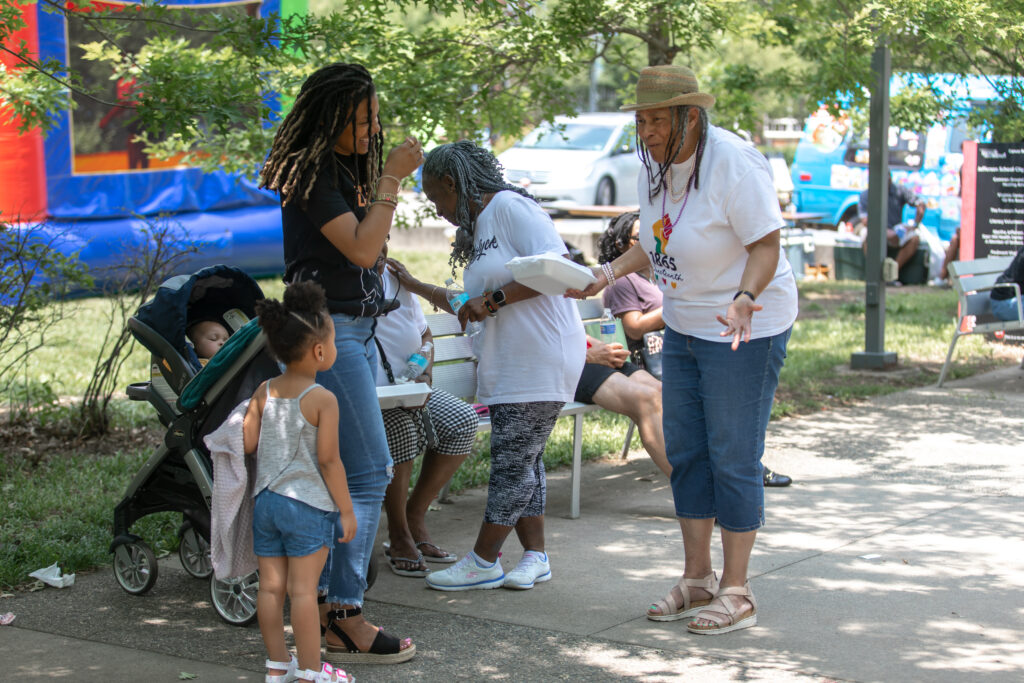
-
Our Annual Programs
Celebrate moments of African American liberation. Learn about the events that our center offers.
-
Greens Cook Off
Learn about how you can be involved in the deepening of our celebration of home cookin.
-
Juneteenth
JSAAHC celebrates June 19, 1865, historically referred to as Jubilee Day, commemorating the final enforcement of the Emancipation Proclamation.
-
Staying Connected
Connect with us to keep up with programs these programs and to learn more about participating in our events.
Celebrate With Us
Our public programs allow the Charlottesville community and its visitors to hang with old friends, learn something they never knew before and to look at each other through eyes filled with joy.
Liberation and Freedom Day

At the time of the Civil War, 53.3 percent, some 14,000 residents of Charlottesville and Albemarle County were enslaved, a historical fact which remained little known until the 2016 work of the city’s Blue Ribbon Commission on Race, Memorials and Public Spaces (BRC). In 2017 at the BRC’s recommendation, the Charlottesville City Council proclaimed March 3 to be Liberation and Freedom Day.
Liberation and Freedom Day, now a local holiday, recognizes the March 3-6, 1865, arrival of Union cavalry in the area. Town and university officials surrendered the City at the current site of the UVA Chapel, and thousands of enslaved residents took the opportunity to escape by following U.S. troops as they continued their advance toward Petersburg, Virginia.
In 2019 we created our Liberation and Freedom Day Reparations run/walk. We partnered with the amazing Prolyfyk Run Crew to establish the near 8 mile route, which allows participants to engage with important markers of our local African American history. The run also raises “pocket-money” for small African American organizations who have limited fundraising ability.
Our 2026 Liberation and Freedom Day Reparations run/walk will take place on February 28, 2026.
Juneteenth

Also known as Freedom Day, Jubilee Day, and Liberation Day, Juneteenth commemorates the day that enslaved people in Galveston Texas were finally emancipated. This year’s festivities occur on June 14, from 9-3 pm.
If you are part of an African American organization March with us from Jackson P. Burley to the Jefferson School City Center as we recognize this special day. This year’s Grand Marshal is Mayor Juan Diego Wade. Line up for the parade begins at 9am.
Stay for the Black Business Expo, which will be on the yard with over 20 Black owned businesses, a pitch contest and entrepreneurial panels. The main stage will have an Emancipation Concert featuring local and regional artists.
Featured artist on our main stage include:
Greens Cook Off

The annual JSAAHC Greens Cook Off where local cooks face off with Greens, Mac-n-Cheese and Dessert to find out who gets crowned the best happens on September 13, 2025 from 1pm-3pm.
Sign up to be a cook and show off your skills.
If you would like to be a cook this year or be part of the planning team, contact us at info@jeffschoolheritagecenter.org
Kwanzaa

Kwanzaa was created in 1966 during the aftermath of the Watts riots by Maulana Karenga to give blacks an alternative to the existing Christmas holiday. Kwanzaa derives from the Swahili phrase matunda ya kwanza meaning first fruits. The holiday is centered around the Nguzo Saba–the seven principles of African heritage.
Our celebration begins as 2 pm and includes activities for kids and adults alike!
To join the planning committee contact us at info@jeffschoolheritagecenter.org
Evelyn Barbour Lecture Series
Our series is named after Evelyn L. Barbour, who passed in 2014 at the age of 78 after a short illness. She attended the Jefferson School and was among the first graduating class of Jackson P. Burley High School. She was an alumnus of Virginia Union University and the University of Virginia School of Education. She taught in various school systems and retired after more than 30 years of service. Ms. Barbour was a lifelong member of Mount Zion First African Baptist Church and her most notable work in the church was her role as historian. This series celebrates her work documenting history by creating oral histories in the form of conversation and connection.
- February 27 at 6PM, Dr. Andrea Douglas will be in conversation with Joshua D. Rothman.
A graduate of the University of Virginia, Rothman is the author of three books on the history of American slavery, including, most recently, The Ledger and the Chain: How Domestic Slave Traders Shaped America

View Upcoming Events
Visit our events section to see our upcoming annual programs, gallery talks, exhibitions and more.
Contact Us
Have questions about our public programs? Send us a message. We are happy to answer any questions.
Hours
Heritage Center
Tuesday – Friday 1.00 pm – 6.00 pm
Saturday 10 am – 1 pm
Closed Monday & Sunday



